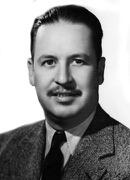
Rafael F. Muñoz (Chihuahua, 1899 - Mexico City, 1972) was the son of a prominent Chihuahua lawyer. He spent his childhood on the El Pabellón estate, near the United States border, where he enjoyed a large library. He studied at the Scientific and Literary Institute of Chihuahua. He later moved to Mexico City to study at the National Preparatory School, but following the Huerta usurpation, he was forced to return to Chihuahua. He began his career as a journalist in February 1914 with a chronicle on the Ten Tragic Days, published in the newspaper Vida Nueva, for which he also served as an editor and translator. He sympathized with Obregón and, during the Carranza administration, went into self-imposed exile in California, United States. Upon his return to Mexico in 1920, he contributed to various newspapers; he was editor-in-chief of El Universal Gráfico and, in 1930, director of El Nacional. He collaborated with Jaime Torres Bodet as his press officer at the Ministry of Public Education (1943-1946) and the Ministry of Foreign Affairs (1946-1951). He was elected to the Mexican Academy of Language, but died before reading his acceptance speech.
Considered by literary critics as one of the great writers of the Mexican Revolution for his novels Vámonos con Pancho Villa (1931) and Se sacar el caña para Bachimba (They Took the Cannon to Bachimba) (1941), and his short stories, he also wrote the essay: Santa Anna, el dictador resplendent (Santa Anna, the Resplendent Dictator, 1938).






